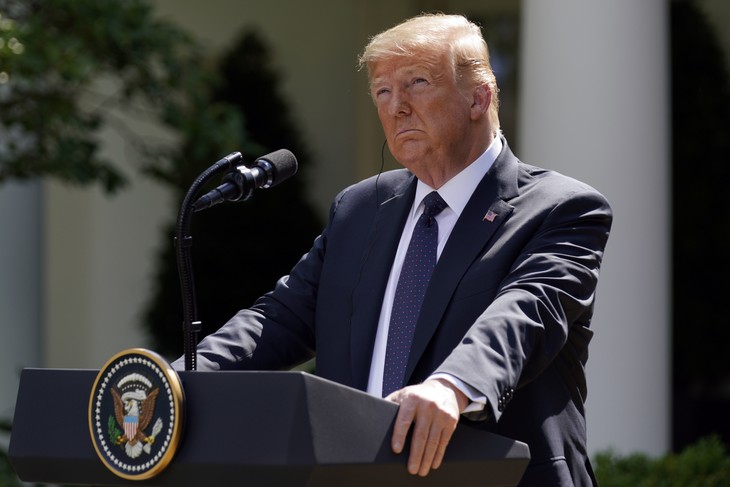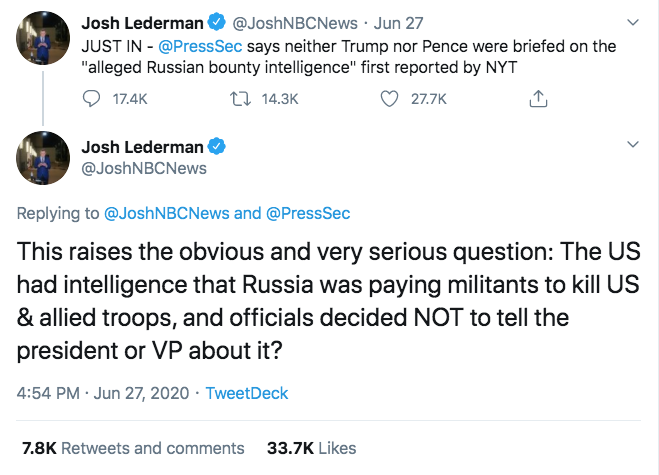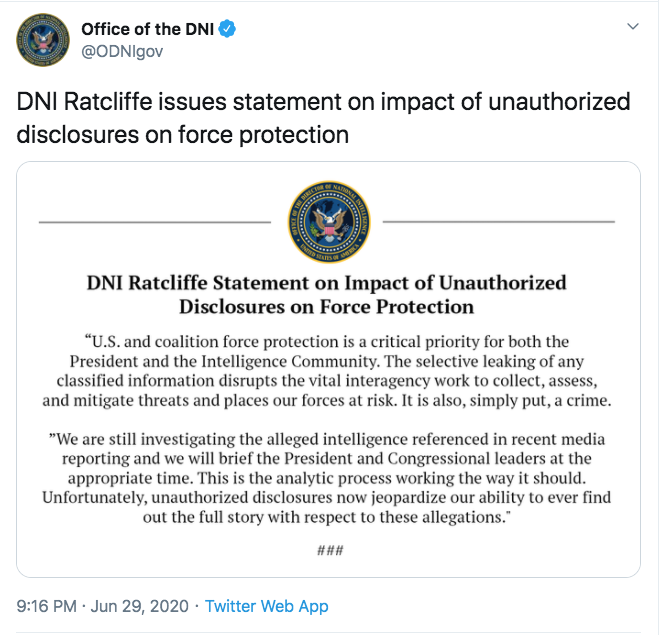Watch nearly the entire corporate media establishment run wild with claims from completely anonymous sources in the intelligence community this week.
Much of the case for the Iraq War was based on the Bush administration’s claim that Saddam Hussein possessed weapons of mass destruction. When the United States declared an end to the war late in 2011, more than 4,400 American military members had been killed and nearly 32,000 wounded. No weapons of mass destruction had been found.
It’s one of the most significant and catastrophic intelligence errors in U.S. history. A bipartisan commission found that U.S. intelligence “
seriously misjudged” Iraq’s weapons program because of their “heavy reliance on a human source–codenamed ‘Curveball’–whose information later proved to be unreliable.” The commission wrote, “Even more misleading was the river of intelligence that flowed from the CIA to top policymakers over long periods of time–in the President’s Daily Brief (PDB)” and other reports that were “more alarmist” and “less nuanced.”
Curveball was Germany’s codename for Rafid Ahmed Alwan al-Janabi, an Iraqi defector who claimed to have built mobile weapons laboratories. President George W. Bush highlighted the claims in his
2003 State of the Union address.
Secretary of State Colin Powell’s speech to the United Nations on February 5, 2003,
relied heavily on Curveball’s claims. “My colleagues, every statement I make today is backed up by sources, solid sources. These are not assertions. What we’re giving you are facts and conclusions based on solid intelligence. I will cite some examples, and these are from human sources.”
Powell went on to describe Janabi’s claims at length, concluding, “This defector is currently hiding in another country with the certain knowledge that Saddam Hussein will kill him if he finds him. His eyewitness account of these mobile production facilities has been corroborated by other sources.”
The intelligence failure became a widespread media failure when reporters uncritically regurgitated the weapons of mass destruction claims from their intelligence community sources. Academics, pundits, and journalists themselves have decried the media’s performance in the lead-up to the 2003 invasion of Iraq. The New York Times and Washington Post even published their regrets about their own coverage, which frequently took the intelligence community’s claims at face value.
It’s important history to remember as you watch nearly the entire corporate media establishment run wild with claims from completely anonymous sources in the intelligence community this week. By comparison, the reporters back in 2002 and 2003 seem to have been downright judicious in their handling of the intelligence community claims.
Our Latest Intel Drama On Russia
On Friday, three New York Times reporters
wrote that “American intelligence officials have concluded that a Russian military intelligence unit secretly offered bounties to Taliban-linked militants for killing coalition forces in Afghanistan — including targeting American troops — amid the peace talks to end the long-running war there, according to officials briefed on the matter.”
This allegedly airtight intelligence was “briefed to President Trump,” and “officials” came up with ideas for potential responses, including a diplomatic complaint and sanctions, but the White House had yet to authorize anything. The intelligence, the reporters claimed, had been shared with the British government.
The anonymous leakers of the information, the reporters claimed, are totally certain that “Russian operatives” offered and paid bounties, but they have “greater uncertainty” about who authorized the plan. The reporters included some speculation about why such a bounty operation would be done. There was no speculation about the motivation of the leaking “officials.”
Reaction to the Anonymous Report
It is worth noting that the three New York Times reporters — Charlie Savage, Eric Schmitt, and Michael Schwirtz — also played key roles in disseminating the Russia collusion hoax, in which anonymous intelligence officials worked with co-conspirators in the media for years to put out a false and defamatory narrative that President Donald Trump had colluded with Russia to steal the 2016 election or was otherwise compromised. The New York Times was one of the biggest outlets engaged in the Russia hoax. The reporters even include some of their previous Russia collusion hoax spin, and omit key facts about Trump’s actions against Russia, in their bounty story.
Literally nothing about the political media’s use of anonymous sources to spread republic-damaging disinformation in recent years should lead anyone to treat further anonymously sourced reports with any deference. Yet the entire corporate media establishment immediately ran wild with the story and used it to suggest it was further evidence that Trump was an agent of Russian President Vladimir Putin. The story dominated cable news over the weekend and into the following week.
Republicans who support continuing the war in Afghanistan indefinitely, even though it has been going on for 19 years, expressed grave concern about the report. Republican Rep. Liz Cheney, whose father had authoritatively claimed in August 2002 there was “
no doubt” Iraq had weapons of mass destruction, reflexively accepted the anonymously sourced reports and
demanded answers and action.
It turned out that key details of the story were disputed by on-the-record sources. When the White House press secretary said neither Trump nor Vice President Mike Pence had even been briefed on this intelligence,
reporters tried a new line of attack.
Director of National Intelligence
John Ratcliffe added, “I have confirmed that neither the President nor the Vice President were ever briefed on any intelligence alleged by the New York Times in its reporting yesterday. The White House statement addressing this issue earlier today, which denied such a briefing occurred, was accurate. The New York Times reporting, and all other subsequent news reports about such an alleged briefing, are inaccurate.”
White House Director of Strategic Communications Alyssa Farah
disputed that the intelligence was as airtight as the New York Times reporters had claimed, based on their anonymous and unaccountable sources: “POTUS wasn’t briefed on the reports related to Afghanistan because there is no consensus within the intelligence community on the allegations at this point. The veracity of the underlying allegations continues to be evaluated.”
Yet the frenzy from the media continued, almost as if coordinated as part of an operation.
Anonymous Sources Can’t ‘Confirm’ Anything
A quick note on anonymous sourcing. Following the New York Times report, other media outlets ran with stories on the matter also based on anonymous sources. Frequently, this was described as “independent confirmation.”
However, anonymous sources can’t “confirm” anything for a reader, on account of being anonymous. And because they’re anonymous, there is no way to tell if one media outlets’ sources are independent from another’s.
While this should be obvious, perhaps an example from the Russia collusion hoax will help. On Dec. 8, 2017,
CNN’s Manu Raju and Jeremy Herb reportedthat multiple anonymous sources had confirmed an email was sent to Donald Trump, Jr., with advance information about a WikiLeaks document release.
The story was a train wreck, in that it didn’t include any evidence that the random guy who emailed Trump, Jr., was correct in his emailed claims, that the email had been opened, or that the emailer was connected to Russia. But even more than that, it turned out that the multiple anonymous sources had somehow gotten the date of the email wrong. Rather than the email giving advance notice of a WikiLeaks document release, it was an email about a document release that had already happened to great public fanfare.
Before that embarrassing ending for CNN, though, other media outlets claimed to have independently confirmed CNN’s story. CBS claimed to have “
confirmed” the story. Russia collusion hoaxer “Fusion” Ken Dilanian claimed “
two sources” had confirmed CNN’s report to him.
So what happened? Well, probably two buddies working on a congressional committee both sold the false story to all three outlets. Two buddies working together on a committee that leak the same false information to multiple outlets aren’t independent of each other, much less independent confirmation for each network. They’re just two leakers who somehow aren’t bright enough to know how to properly read dates on emails.
What’s the Criminal Leakers’ Motivation?
DNI Ratcliffe notes that leaks of information such as what the leakers are spreading throughout the media
can be quite damaging.
Intelligence collection and intelligence analysis are more art than science. If the Curveball information was presented as airtight and used to launch a protracted war, this intelligence seems to be in only the earliest stages of analysis and heavily in dispute. So why is it being leaked (when such leaks are a criminal offense)? And why are the media so anxious to use this sketchy information?
Perhaps their goal is to fight the Trump administration’s efforts to end the 19-year-war in Afghanistan, damage international relations, distract from the Russia collusion hoax currently under investigation, or any number of other things. Sometimes leaks are about internal bureaucratic wars involving people who don’t care about the damage caused by their leaking.
One goal seems to be to paint Trump as someone who does not care about American soldiers. This talking point is odd. Iran reportedly offered the Taliban
$1,000 bounties in 2010 for American soldiers’ deaths in Afghanistan. Not only was no action taken by President Obama at the time, six years later, he authorized the payment of $1.7 billion to the regime.
By contrast, President Trump authorized the killing of Iran’s Qasem Soleimani, responsible for the deaths of more than 600 U.S. service members. When that happened, based on what the Trump administration said was responsibility for those deaths and intelligence that further attacks were planned, many in the media questioned the strength of that intelligence analysis.
The Story Keeps Changing
The story also seems to keep changing. At first it was about how Trump had been given airtight intelligence and refused to do anything about it. Then the goalposts shifted to how “White House officials” knew something or other.
An Associated Press story now
asserts without evidence that John Bolton, who is on a book tour right now, “told colleagues he briefed Trump on the intelligence assessment in March 2019.” But in
a softball interview Sunday by Jake Tapper, a reporter who played a key role in initiating the false Russia collusion hoax at CNN, Bolton repeatedly stressed his lack of knowledge about the story and his suspicion it might not be true.
“First we have to stress there is much we don’t know about this,” he said. “With all due respect to the highly esteemed news services you mention, they get stuff wrong time to time,” he added. “My only caution is before we go too far down the track, just because there are press reports doesn’t mean its accurate.” After a record-breaking use of the word “if” from Tapper, Bolton said, “Well again, underlining the word ‘if’ on whether it’s true…”
It is of course entirely possible that Bolton is leaking to the Associated Press and lying about his views now, or that he was lying then, or that Bolton’s colleagues are leakers and they are lying. But it seems the media aren’t caring about the facts so much as the overarching plan to believe this intelligence is airtight no matter what, that the intelligence was definitely briefed to Trump and Vice President Mike Pence, no matter what, and that this story must continue to be pushed on airwaves no matter its deficiencies or the obvious coordination of its rollout.
Democrats, Media Using Story to Perpetuate Russia Hoax
Most exasperating, the media and other partisans seem eager to run back into the comforting arms of the Russia collusion hoax they perpetrated against the country for years.
Tapper, for example, asked Bolton, “Do you think it’s possible that Putin has information on President Trump?” The New York Times reporters also dredged up the debunked Russia collusion theories. And not coincidentally, Speaker of the House Nancy Pelosi spent several minutes
pushing the debunked Russiagate conspiracy theory in an interview with ABC News’ George Stephanopoulos.
“With him, all roads lead to Putin. I don’t know what the Russians have on the president politically, personally, financially, or whatever it is. But he wants to ignore, he wants to bring [Russia] back into the G8 despite the annexation of Crimea and the invasion of Ukraine…despite what they yielded to him in Syria, despite his intervention into our elections which is well documented by our intelligence community and despite possibly this allegation which we should have been briefed on,” Pelosi said.
Pelosi’s pushing of the conspiracy theory met virtually no pushback from the former press secretary to President Bill Clinton. In fact, there has been no accountability for any of the actors who spread the false and damaging conspiracy theory about Russia.
None of the criminal leakers have been held accountable. Neither have the reporters who conspired with them to harm the republic, damage the Trump administration, hurt foreign relations, and destroy the lives of conservatives who allied themselves with Trump.
In fact, they’re free to continue their operation with the latest round of Russia stories, seemingly designed to undermine the Trump administration, hamper foreign policy changes that might lead away from the interventionist foreign policy of recent administrations, and otherwise hurt the country.
It is as if our political and media establishments refuse to learn anything from the weapons of mass destruction and Russia collusion hoax intelligence failures of recent years. Or worse, they learned just how easy it is to use unverified intelligence for political aims.





















